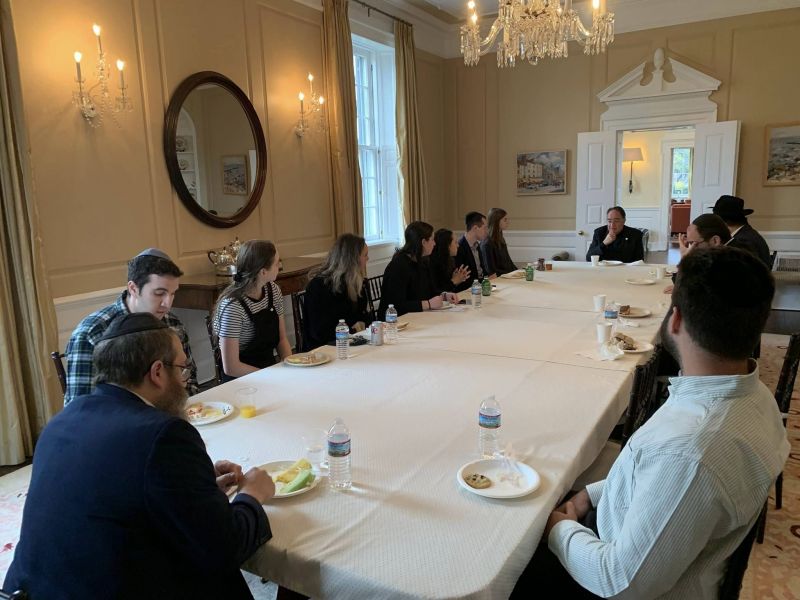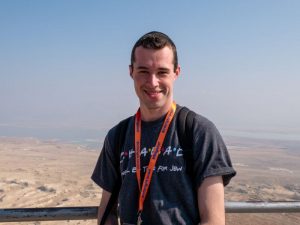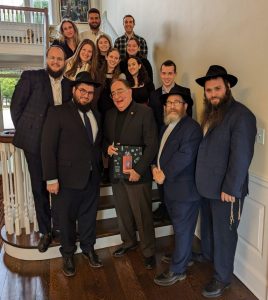
It’s not every day that students get the ear of an academic administrator, let alone the time to sit down with them for a two-hour informal discussion. But that is exactly what eight students affiliated with their Chabad centers on campus from four universities got the chance to do last month on a Sunday morning at Hidden Waters, a mansion in Baltimore owned by the University System of Maryland Foundation.
At a long table in an immaculate room, the group of young men and women from Towson University, the University of Maryland at College Park (UMD), the University of Maryland Baltimore County (UMBC) and the University of Maryland, Baltimore (UMB) gathered to share their thoughts, experiences and concerns about Jewish life on campus with Jay A. Perman, chancellor of the University System of Maryland.
The students were accompanied by their respective Chabad-Lubavitch shluchim, or emissaries: Rabbi Mendy Rivkin, who with his wife, Sheiny, directs Chabad-Lubavitch of Towson; Rabbi Eli Backman, who with his wife, Nechama, directs Bais Menachem Chabad Jewish Student Center at UMD; Rabbi Dovid Reyder, who with his wife, Chani, directs Chabad of Catonsville and UMBC; and Rabbi Yaakov Kaplan, who with his wife, Chana, directs Chabad of South Baltimore and UMB. Chana Kaplan also joined the Jan. 22 discussion with the chancellor and students.
Yisrael Wealcatch, 21, a mechanical engineering major at UMBC who is set to graduate this spring, said that the time was productive, and that it was “good to know” that the chancellor cares about issues important to students. “He happens to be Jewish, and he talked about how strongly he identifies and how much he values being Jewish. That was good to hear,” said Wealcatch.

It comes amid alarming headlines on a regular basis about antisemitism on campus and Jewish students being made to feel awkward, nervous or worse about exhibiting their identity and, in many cases, their support of Israel.
That speaks to Wealcatch even more now that he visited Israel for the first time. He returned three weeks ago from a Birthright trip that included four students from his school and about 30 others from different colleges across the country.
“Growing up Jewish, you hear about Israel a lot. You think, it’s important, but is it really that special? And the answer is yes! It is that special. Walking on the same land that your ancestors did 3,000 or 4,000 years ago and seeing a land so small with such a wide range of geography, history, weather … it was a whirlwind of a two-week trip.”
‘Everyone felt good about where we are’
This semester, Wealcatch sits on the student board of Chabad and is “active in every way possible.”
He said he is inspired by his rabbi and their family not just because they make students feel welcome and at home — all students from all backgrounds — but that they take time for their own Torah study and Jewish growth, from the youngest child on up.
He came to the meeting with some concrete ideas — namely, improving access to kosher food, getting keys so students don’t have to use door swipe cards on Shabbat and having a specific Jewish meeting space on campus. He said “it was comforting to learn that everyone felt good about where we are and talked about things that can be better.”
He explained that further, saying “on my Maryland campus, we have a pretty good feeling of safety. You hear all the scary headlines in the news, but I don’t think most Jewish students feel scared. Most seem curious about Judaism, and professors have been understanding about Jewish holidays and time off.”
‘These are very intense years’
Backman of UMD supported that observation, noting that the university system “from the top down is extremely responsive to any and all concerns,” and that there is an ongoing conversation with the administration and Jewish leaders on campus.
As for antisemitism, he said incidents have been few and far between, and more uncomfortable than dangerous, but when something does happen, it is addressed: “This school is listening, and this school cares.”

He should know; he has been there more than 25 years, and also serves as a chaplain for the university, as well as for the university police department.
The message he sends to students is that Jewish involvement leads to greater ease with one’s Jewish identity: “Getting more involved helps in so many ways.”
Kaplan agreed, saying students can often become overwhelmed with classes and their workload, social issues, emotional issues … going to a Jewish event or Shabbat dinner — taking a few hours to talk about something other than school — can prove invigorating.
“These are very intense years but also a good time to make connections, to engage in Judaism,” he said.
Not only that; comfort can come from the little things as well, like bringing hot chicken soup to students who are under the weather or challah on Shabbat and matzah for Passover. It’s about meeting a whole range of needs.
He said that was one of the reasons for the meeting with the chancellor, pointing out that talking during some downtime and when not in a crisis situation is “a good thing.”
As for Perman, he reported that “it was wonderful to share the morning with students and leaders from Chabad. I regularly invite students from many different groups to talk with me about their college experience — their path to higher ed, their challenges, their plans for the future and what we can do as a system to help them reach their goals. It was great to hear the Chabad students weigh in on the state of Jewish life at their universities, how they cherish and celebrate their Jewish identity, and the relationships they build with classmates from other faith traditions.”
At the conclusion of the meeting, the rabbis gave Perman a gift apropos of their time together: “The Book of Jewish Knowledge,” released in December by the Rohr Jewish Learning Institute (JLI).







